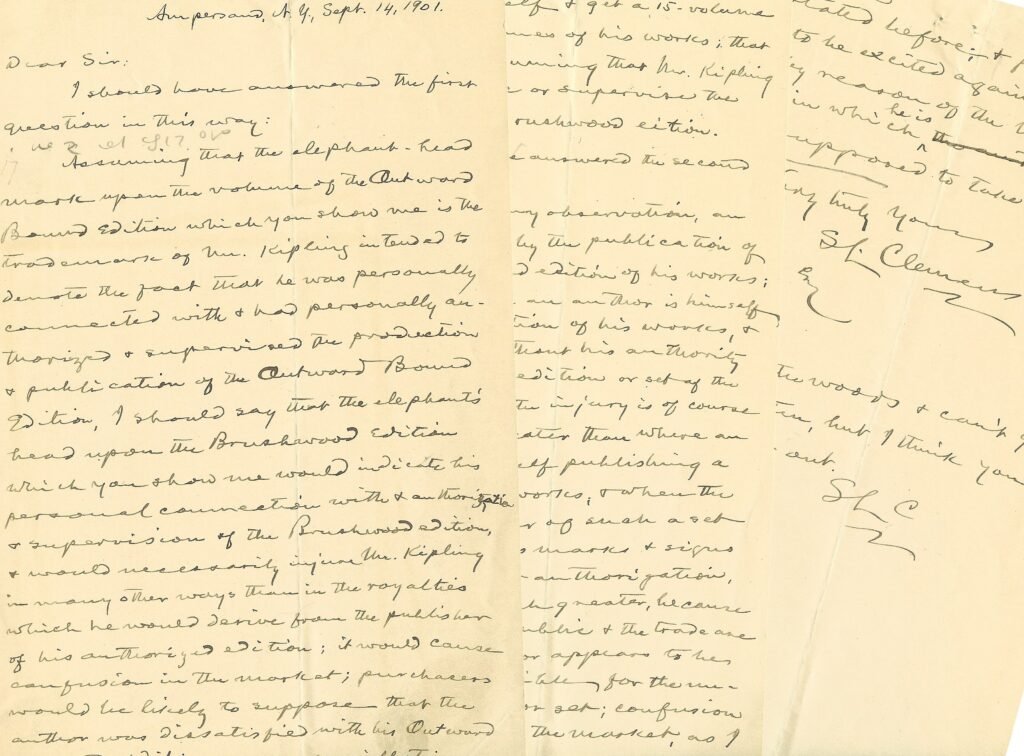MARK TWAIN WRITES TO RUDYARD KIPLING’S ATTORNEY, A.T. GURLITZ:
“AN AUTHOR IS INJURED BY THE PUBLICATION OF ANY UNAUTHORIZED EDITION OF HIS WORKS”
CLARIFYING HIS VIEWPOINTS ON COPYRIGHT LAW FOLLOWING A HIGH PROFILE CASE DURING WHICH TWAIN HIMSELF PROVIDED TESTIMONY IN DEFENSE OF AUTHORIAL RIGHTS
CLEMENS, SAMUEL L. [MARK TWAIN]. (1835-1910.) American humorist, lecturer and writer. Autograph Letter Signed twice, “S.L. Clemens” and “S.L.C.” Three very full, separate pages, octavo. Ampersand, N.Y., September 14, 1901. Very fine condition. To A. Gurlitz, Esq. Clemens writes:
“Dear Sir: I should have announced the first question in this way: Assuming that the elephant-head mark upon the volume of the Outward Bound Edition which you show me is the trademark of Mr. Kipling intended to denote the fact that he was personally connected with and had personally authorized and supervised the production and publication of the Outward Bound Edition, I should say that the elephant’s head upon the Brushwood Edition which you show me would indicate his personal connection with and authorization and supervision of the Brushwood Edition, and would necessarily injure Mr. Kipling in many other ways than in the royalties which he would derive from the publisher of his authorized edition; it would cause confusion in the market; purchasers would be likely to suppose that the author was dissatisfied with his Outward Bound Edition; or was vacillating; or was trying to pass off a book not written by himself and get a 15-volume price for 14 volumes of his works; that is, of course assuming that Mr. Kipling did not authorize or supervise the production of the Brushwood edition.
And I should have answered the second question thus: According to my observation, an author is injured by the publication of any unauthorized edition of his works; and in the case where an author is himself publishing an edition of his works, and another person without his authority also publishes an edition or set of the works of the author the injury is of course likely to be much greater than where an author is not himself publishing a set or edition of his works; and when the authorized publisher of such a set puts upon his books marks and signs intended to represent authorization, the injury is very much greater, because in such a case the public and the trade are deceived, and the author appears to be personally responsible for the unauthorized edition or set; confusion is thereby caused in the market, as I have stated before; and prejudice is likely to be excited against the author by reason of the business methods in which he is thereby supposed to take part. Very truly yours, S.L. Clemens. [P.S.] I am in the woods and can’t get it type-written, but I think you can make it out. S.L.C.”
A.T. Gutlitz served as Rudyard Kipling’s counsel in a suit brought against the publishing house R.F. Fenno & Co., alleging copyright infringement. Clemens was summoned by Gurlitz to appear as an expert on copyright issues. Despite being less than enthused about having been singled out by Gurlitz, Twain spoke candidly in defense of his close friend authorial rights. Just a superior Twain letter on an issue that was important to him throughout most of his life. A better letter would be almost impossible to obtain on this topic, and with these associations just makes it a superior item in every way.
$18,500.00

